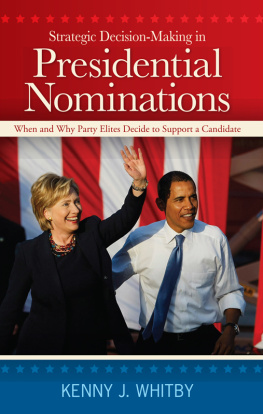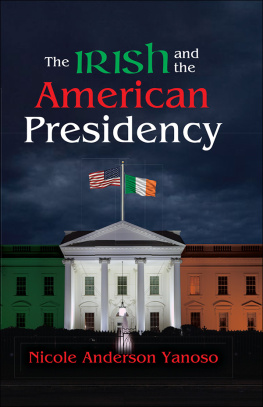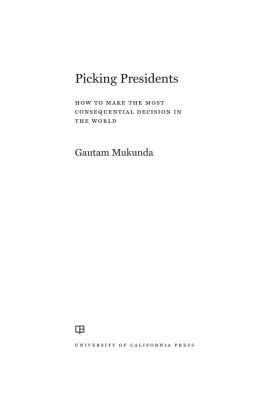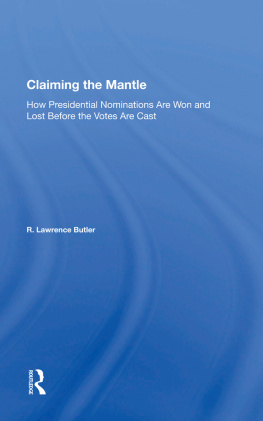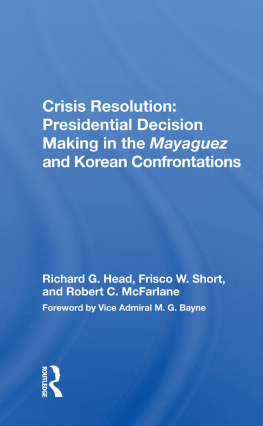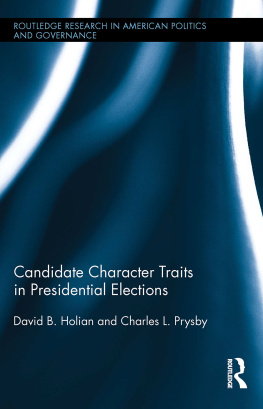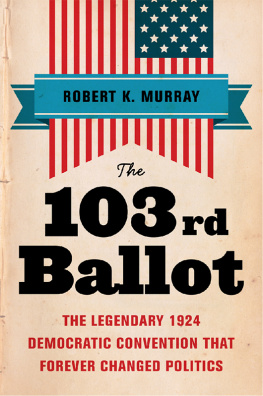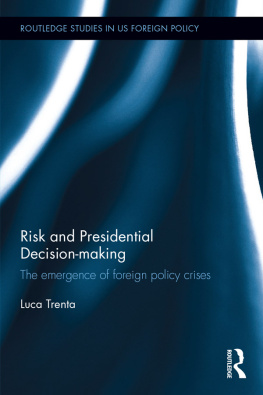Published by State University of New York Press, Albany
2014 State University of New York
All rights reserved
Printed in the United States of America
No part of this book may be used or reproduced in any manner whatsoever without written permission. No part of this book may be stored in a retrieval system or transmitted in any form or by any means including electronic, electrostatic, magnetic tape, mechanical, photocopying, recording, or otherwise without the prior permission in writing of the publisher.
For information, contact State University of New York Press, Albany, NY
www.sunypress.edu
Production by Ryan Morris
Marketing by Michael Campochiaro
Library of Congress Cataloging-in-Publication Data
Whitby, Kenny J.
Strategic decision-making in presidential nominations : when and why party elites decide to support a candidate / Kenny J. Whitby.
pages cm
Includes bibliographical references and index.
Summary: Evaluates how democratic presidential nominations are, using the historic race between Senators Obama and Clinton as a test case
Provided by publisher.
ISBN 978-1-4384-4919-7 (hardcover : alk. paper)
1. PresidentsUnited StatesNomination. 2. PresidentsUnited States NominationHistory21st century. 3. PrimariesUnited States. 4. PrimariesUnited StatesHistory21st century. 5. Political science United StatesDecision making. I. Title.
JK522.W45 2014
324.5dc23
2013002449
10 9 8 7 6 5 4 3 2 1
Acknowledgments
This book evolved out of my fascination with two major events that took place during the 2008 contest for the Democratic presidential nomination. The first event focused on the historic nature of the contest. This was the first U.S. presidential election in which an African American (Senator Barack Obama) and a female (Senator Hillary Clinton) had a realistic chance of capturing a major partys nomination. Indeed, it became obvious to many political pundits relatively early in the campaign that one of the two candidates would become the partys presidential nominee.
The second event focused on superdelegates. These unpledged party leaders and elected officials came on the publics radar in 2008 as a consequence of the drawn-out and competitive Democratic contest between Clinton and Obama. Unlike pledged delegates, who are elected or chosen within a state at a designated level with the understanding that they will support a particular candidate at the national convention, superdelegates would be free to support any presidential candidate they wished for the nomination. Their status as free agents at the national convention was a source of concern for many citizens. In the tightly contested race between Clinton and Obama, this meant that superdelegates might be in a position to hold the balance of power if no clear winner emerged from the primaries. The idea that superdelegates could use their status to choose a candidate and perhaps overturn the will of the people seemed elitist and undemocratic to many observers.
As a student of American politics, I have long been interested in the democratic nature of the political process. The 2008 presidential nomination process was an opportunity for me to examine the concept of democracy from the standpoint of leadership selection and party politics. For most of this nations history, political parties played a crucial role in the selection of candidates to run for public office. In recent decades, the role of the parties in the electoral process has declined somewhat mainly due to an increase in the number of presidential primaries. The primary system was introduced to make the presidential selection process more democratic by involving rank-and-file party members in the nomination process. It is one of the most significant changes in the nomination process in recent decades.
The result of reform changes has led to an important scholarly debate on presidential nominations that centers on the following question: Who controls presidential nominations? More specifically, Are presidential nominations decided largely by party insiders or by candidate-centric factors? To a large degree, this book addresses the foregoing questions by examining the endorsement decisions of superdelegates in the presidential nomination process. The conclusions in this book are important because they have implications for the democratic selection of leadership in America.
The presidential election is a protracted event in which actors weigh the costs and benefits of their actions with some goal in mind. In the context of this study, the actors are party elites, that is, superdelegates. The central argument throughout this book is that superdelegates are deciding to endorse or withhold an endorsement based on some strategic calculation that involves timing. For example, an endorsement of a candidate at a given point during the course of the nomination campaign might be an attempt to affect the voting decision of other actors. Or, an endorsement of a candidate might be in response to campaign factors that occur at various points in the process. In either case, the conceptual and methodological approach used in this study should help us to better understand the strategic decision-making of party elites in presidential nominations.
Debts of gratitude are due to many individuals. I am especially indebted to Lee Walker, a close colleague and friend, who steered me in the right direction when I began this research endeavor. As graduate director in my department, he also gave me the research assistance I needed to carry out the investigation. I am also heavily indebted to William Bill Kreml for his excellent comments and suggestions on the manuscript. He gave the manuscript a careful reading. He has always been a close colleague and friend, and a source of encouragement to me. I was very fortunate to have an excellent graduate student, Jaewon Jang, working with me on the methodological component of this research. He brought preparation, expertise, and diligence to the preparation and analysis of the data. In addition, he was a source of substantive insight throughout the course of the project. Simply put, he played a key role in helping me to bring this research project to fruition. I am deeply indebted to him for his stellar assistance.
Two reviewers gave generously of their time in reading and critiquing my manuscript. Their comments and suggestions greatly improved the work. SUNY press provided me with the assistance of an excellent editor, Michael Rinella. Along with staff members, they moved the manuscript through the editorial and production in a professional and skillful manner. Of course, any errors and confusion that exist in this book are the sole responsibility of the author.

